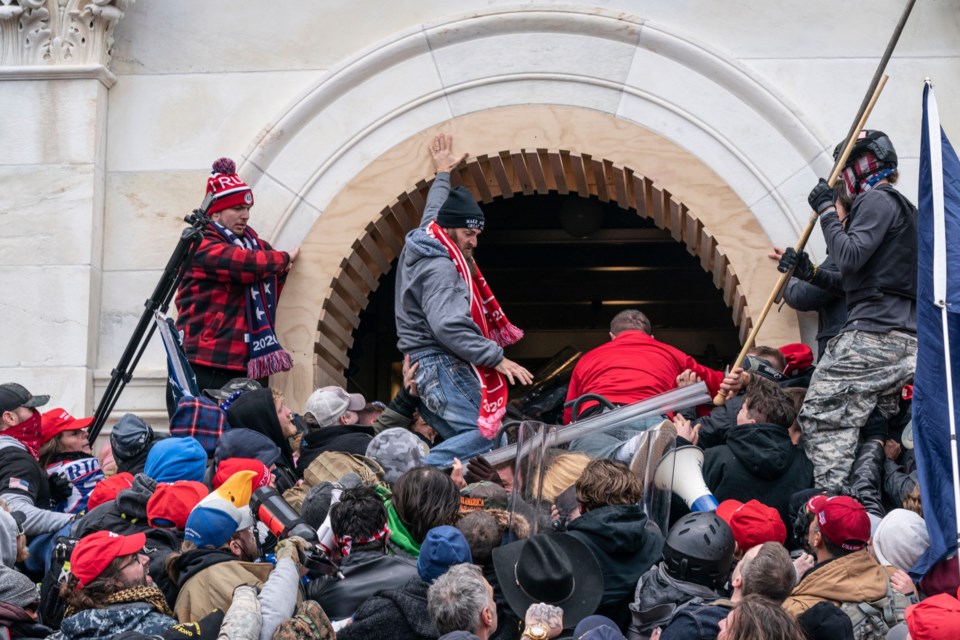It took just four years for Donald Trump’s America to devolve into the riotous circus that overran the U.S. capitol earlier this week.
Of course, the ingredients were there for much longer, but a mere four years of stirring the populist political pot by Trump and his enablers led thousands of Americans to overrun the seat of U.S. democracy – albeit temporarily, and with no idea what to do after selfies in the Speaker’s seat.
Canadians watched in fascination and fear as our closest neighbour and largest trading partner teetered on the brink of democratic collapse. And we watched with some condescension.
Most of us see the crumbling of the American empire almost as entertainment, firm in the belief that it couldn’t happen here.
It could, and to some degree it already is.
Authoritarian populism like that espoused by Trump is “an acute and rising threat,” warns a recent research paper published by the University of Calgary’s School of Public Policy.
Frank Graves and Jeff Smith looked at the rise of authoritarian – or ordered – populism in the U.S. and Europe and whether the same factors are at play in Canada.
“Canada has not been left untouched by a new authoritarian, or ordered, populism that has seen the election of Donald Trump as U.S. president and the United Kingdom vote to leave the European Union,” they wrote in Northern Populism: Causes and Consequences of the New Ordered Outlook.
Populism is “a significant political force, replacing the traditional left-right political spectrum” in Canada, they warned.
“Unfortunately, the level of awareness and recognition of this force in Canada is very low. The level of understanding of what truly causes it, let alone how to approach it from a public policy perspective, is lower still,” they wrote.
Graves, founder and president of EKOS Research Associates, and Smith, a researcher at EKOS, surveyed more than 7,000 Canadians and found 34 per cent expressed some authoritarian populist views.
“The evidence is very clear. Ordered populism is a critical and poorly understood force in Canada,” they wrote.
Even as rioters smashed windows at the U.S. Capitol, small groups of supporters ventured out to wave the Trump flag north of the border, including Vancouver and Prince George.
The strong-man populism that has brought the U.S. and Britain to the knee go hand-in-hand with the decline of the middle class and the growing wealth gap, declining trust in government and polarizing politics.
All of these are at play in Canada.
The proliferation of anti-mask demonstrations, internet conspiracies about COVID and vaccines, and the increasing polarization on both the right and left of our own political spectrum are evidence enough that the same spark is already burning here and could easily be fanned by unscrupulous politics and external agitators, which is certainly the case in the U.S. and Britain.
I’m alarmed to see the number of extremist posts on public discussion groups in my own community about pandemic conspiracies, government corruption hoaxes, anti-vaxx videos purporting to tell “the real truth,” and rants against the “fake news.”
These conspiracy theories convinced thousands of Americans, encouraged by the country’s president, to a violent uprising in Washington, D.C. on Tuesday with the firm belief that the recent U.S. election was corrupted. But Trump is not the disease killing democracy; he is a symptom.
The media continues to have an important role to play, as it always has. The decimation of professional media in Canada over the past decade will have disastrous consequences if not addressed.
And the education system, too, needs to ensure that Canadians graduate with not just a decent GPA but the ability to think critically, to discuss and debate with reason, and with a clear understanding of not just their rights as citizens but their responsibilities.
Dismissing the mob as ignorant yahoos and racists does nothing to stem the rising tide of division. It may not be easy to understand them – but it’s more dangerous to ignore them.
Dene Moore is an award-winning journalist and writer. A news editor and reporter for The Canadian Press news agency for 16 years, Moore is now a freelance journalist living in the South Cariboo. Moore’s two decades in daily journalism took her as far afield as Kandahar as a war correspondent and the Innu communities of Labrador. She has worked in newsrooms in Vancouver, Montreal, Regina, Saskatoon, St. John’s and Edmonton. She has been published in the Globe and Mail, Maclean’s magazine, the New York Times and the Toronto Star, among others. She is a Habs fan and believes this is the year.
SWIM ON:
- Dene Moore last looked at the consistently high crime rate in rural communities, and offered two reasons why.
- In stark contrast, Warren Kinsella remembered a very different sort of politician - former Prime Minister John Turner.
- In May, Anil Anand shook his head at the abject failure in the world's two largest democracies (India and the United States) to deal with the COVID-19 pandemic.



